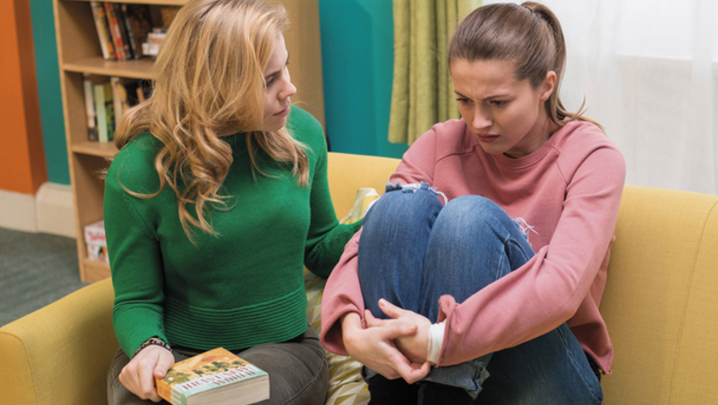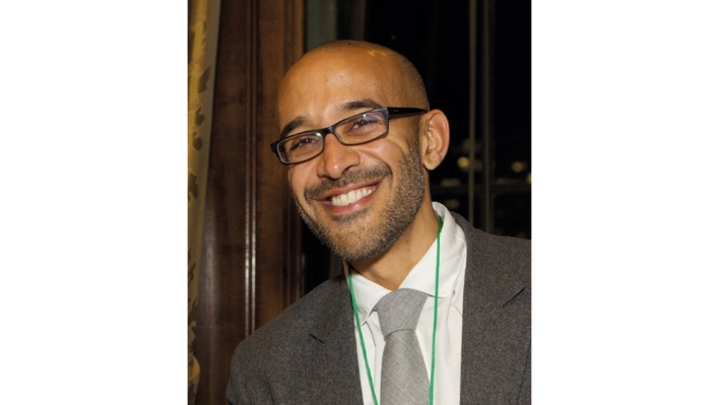“If that storyline wasn’t there, I would not be here. That’s the reality of it. You have saved my life.” That’s what Hollyoaks fan John told one of the soap’s stars, Ashley Taylor Dawson, when the pair were brought together by BBC Radio 5 Live earlier this year.
John, who uses gender neutral pronouns, had previously phoned the station to share how they had been struggling during the lockdown of 2020, to the point where they had planned to end their life. Then they happened to sit down and watch an episode of Hollyoaks, coincidentally the traumatic conclusion of a depression storyline featuring two characters Kyle and Darren.
“Kyle took his own life, but Darren didn’t, and you see the fallout of that,” explains Taylor Dawson, who has played Darren for more than two decades. “It was very testing as an actor, but the feedback was humbling and overwhelming, and then I spoke to John. They told me, ‘I saw the reaction of the family, and I saw my own mum in my head, and I realised I couldn’t do it.’
“Television reaches so many people, and if it helps just one person like John, it’s invaluable.”
Hollyoaks has been tireless in highlighting mental health issues. A forthcoming storyline concentrates on character Diane Hutchinson’s struggle with obsessive compulsive disorder (OCD). But it is by no means the only TV show to both reflect and help drive the UK’s increasing concern with people’s mental welfare.
Clive Crump, a mental health worker at Emotional Wellbeing and Mental Health Service, credits modern writers with striking a delicate balance between compassion and narrative thrills. “On the one hand, they demonstrate that mental illness is just part of the tapestry of normal human life and, on the other, they serve ever-more sophisticated demands for drama and entertainment,” he says.
This new readiness to explore previously hidden aspects of all our psyches is apparent in almost all of the best of today’s TV scripted shows – from soaps to hard-hitting drama and through to comedy.
Crump cites Paul Mescal’s delicate depiction of depression and anxiety in Normal People, as well as Alison Steadman’s “remarkable performance” in Mike Bartlett’s Life. She plays a 70-year-old woman suddenly questioning her identity, having been mocked into a hollow existence by her long-time bully of a husband.
One writer clearly willing to embrace both light and shade is Will Sharpe, the creator, director and star of Channel 4’s Flowers, the show he has described as a “comedy with a mental illness”. Sure enough, it is brutally dark and achingly funny, as the Flowers family contends with all types of mental challenges, including father Maurice (Julian Barratt)’s depression and failed attempt to end his life in the very first scene of the show.
‘Flowers is both brutally dark and achingly funny’
Comedy became Sharpe’s tool to break down the walls between his characters and their audience. He revealed: “I felt frustrated by the lack of understanding surrounding mental illness. I guess some things can feel so heavy or painful that it seems safer just to look away. But comedy can be a really helpful tool to process stuff like that.”
TV shows have come a long way from using mental illness simply as a colourful plot device, often to make fun of a particular character. A crucial aspect of this evolution on screen is the collective sense of responsibility of broadcasters, writers, and actors to present far more authentic depictions of the challenges and feelings of those suffering.
Angela Samata, a suicide prevention campaigner for nearly two decades after losing her husband, has served as a script advisor to Hollyoaks on storylines. She credits this increasing attention to detail for the impact of storylines on vulnerable viewers such as John.
“Writers have always reflected the mood. What’s different is the diligence behind the storylines now,” she explains. “We took the actor, Ashley Taylor Dawson, and the writers to a house of therapy in Liverpool, where a man who had been feeling actively suicidal agreed to speak. Ashley was listening intently to him explaining his feelings and, later, on screen, I heard those same words reflected in the script.
“Since then, we’ve had people reaching out for support who wouldn’t have done it without that storyline. It was beautifully acted, but the words came from the truth of the situation, and that’s why it was able to touch them.”
One writer able to chart this growing need for diligence is Hans Rosenfeldt, the creator of The Bridge, with its supreme but socially awkward female detective, Saga Norén, and, more recently, ITV’s Marcella, with its equally talented but troubled crime-fighting protagonist.
“We created Saga almost 15 years ago, and she was just a character with no social skills,” he remembers. “We developed her over four years, until one director said, for the first time, ‘This woman must be on the autistic spectrum somewhere’.
“Back then, you could get away with a more vague portrayal, whereas now you have to be very careful with research into what she does and doesn’t do. We never even thought about it. It was only when the comments came in, it kind of became the truth. In our universe, she was just Saga.”
Rosenfeldt agrees that Marcella is a far more up-to-date, diagnosable creation. Although he jokes that her PTSD, capacity for blackouts and even eventual disappearance into another identity are all “simply plot-devices”, it becomes clear that the writer has done plenty of his own research into these conditions.
In contrast with Samata, however, Rosenfeldt’s equal duty of care comes out, it seems, in knowing his limitations: “For neither of these characters did we say this is a true description of a diagnosis or syndrome. If anything, I felt responsibility not to give them diagnoses. The moment you claim this is the truth, you become limited in the stories you can tell, because you have to do it right for that community.’
Despite such different approaches, it is evident that contemporary writers delight in the rich texture provided by characters who are both challenged and challenging – what Peter Bowker, creator of The A Word, about a family living with their child’s autism, describes as “somebody at the centre of something that doesn’t quite fit. From a purely selfish dramatist’s point of view, there’s no doubt about it, it’s incredibly rich territory.”
Rosenfeldt adds that these characters in all their complexity are also key to keeping modern viewers fulfilled. “Audiences are so much bigger, and one crime story is much like another, so you need characters who viewers will want to return to. That means more layers – and one that works well is a kind of flaw, something broken, so we can root for it to heal, or at least [for a character to] learn to deal with it.”





